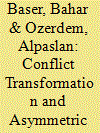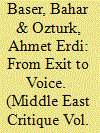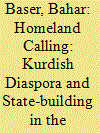|
|
|
Sort Order |
|
|
|
Items / Page
|
|
|
|
|
|
|
| Srl | Item |
| 1 |
ID:
183034


|
|
|
|
|
| Summary/Abstract |
In this article, we examine the dynamics of the Kurdish-Turkish peace process that collapsed in the summer of 2015. The negotiations began when the conflict reached a certain level of ripeness, one that made it possible for both sides to entertain the possibility of compromise on various taboo issues. However, in the face of both domestic and international developments, the process came to an abrupt halt. This article argues that the main reason the process stalled was because it was built from the start around the idea of “resolution” rather than “transformation,” a concept better suited to responding to highly fluid asymmetric conflicts.
|
|
|
|
|
|
|
|
|
|
|
|
|
|
|
|
| 2 |
ID:
084702


|
|
|
| 3 |
ID:
164808


|
|
|
| 4 |
ID:
188181


|
|
|
|
|
| Summary/Abstract |
The authoritarian turn in Turkey compelled many citizens to change life trajectories which included extreme measures such as migration and exile. Thousands of people left Turkey in the last decade, this recent wave constituting one of the largest Turkish migrations to Europe and beyond. The profile of the migrants included those who were comfortable with and/or opposed the current regime’s political and social policies, members of oppressed minority groups, Gülen movement members who are accused of orchestrating the failed 2016 coup attempt as well as white collar and secular Turkish citizens who made lifestyle migration choices because of the political and economic developments in the country. The article focuses on the narratives of a specific group within this new wave, those whom we refer to as Turkey’s intelligentsia in exile, and who decided to leave Turkey following the Gezi protests in 2013. The findings are based on 25 interviews conducted in 2021 with former academics, activists, artists, journalists and politicians who migrated to a variety of locations as a result of pending trials or arrest warrants against them, dehumanization discourse that pro-regime politicians directed toward them, as well as lack of freedom of speech and assembly.
|
|
|
|
|
|
|
|
|
|
|
|
|
|
|
|
| 5 |
ID:
188174


|
|
|
|
|
| Summary/Abstract |
Diasporas have become a topic of academic and political discussion and interest since 2000. Until recently, most diaspora research has focused on the ways the states in the Global North ‘receive’ outsiders but has devoted limited scrutiny to the role of sending states in shaping opportunity structures abroad.1 The recently growing literature on diaspora politics draw our attention to the rise of state-led diaspora engagement initiatives which aim at cultivating, (re)building, (re)shaping and (de/re)mobilizing diasporas. Currently, more than one hundred states have established forms of diaspora engagement policies and institutions, with a variety of motivations.2 Scholars try to understand the development of diaspora-engagement policies cultivated by political actors in the homeland from various disciplines including international relations, political science and sociology.
|
|
|
|
|
|
|
|
|
|
|
|
|
|
|
|
| 6 |
ID:
090321


|
|
|
|
|
| Publication |
2009.
|
| Summary/Abstract |
This article looks at the dynamics of Diaspora groups as a possible catalyst for peace-building within violent segmented societies. With the help of two case studies, Irish-America's role in Northern Ireland and Sri Lankan Tamil Diaspora's role in Sri Lanka, it locates the variable impacts of Diaspora involvement in violent conflicts within their homelands. Despite their unique histories and individual complexity, both of these cases illustrate that Diasporas have a significant role to play in peace-building, are diverse rather than homogenous communities, and that they represent an important and often underutilized resource to bring negotiated settlement to violent conflicts.
|
|
|
|
|
|
|
|
|
|
|
|
|
|
|
|
| 7 |
ID:
159236


|
|
|
|
|
| Summary/Abstract |
The Kurdistan Region of Iraq (KRI) has regional autonomy within Iraq and it has been undergoing institution- and state-building for the last decade. The Kurdish diaspora has played a major role in this process by providing vital assistance to reconstruction and development efforts. This article examines the interactions between the Kurdistan Regional Government (KRG) and its diaspora by focusing on the diaspora engagement initiatives formulated by the KRG. The arguments are based on extensive fieldwork (2012–2016) that the author conducted in the KRI and Europe, including interviews with diaspora members, returnees and policy-makers.
|
|
|
|
|
|
|
|
|
|
|
|
|
|
|
|
| 8 |
ID:
158927


|
|
|
|
|
| Summary/Abstract |
The growing literature on diasporas’ involvement in homeland conflicts shows that diasporas have the power to influence political, social and economic developments in their country of origin and residence. Although this is an emerging field of research, there is still much to discover about the roles that diasporas play in conflict resolution and transitional justice. This article intends to fill this gap by scrutinising the Kurdish Diaspora as a case study. It explores the intricacies of integrating diasporas into conflict resolution by analysing approaches of homeland actors and fragments within diaspora throughout the different stages of the peace processes.
|
|
|
|
|
|
|
|
|
|
|
|
|
|
|
|
| 9 |
ID:
173147


|
|
|
|
|
| Summary/Abstract |
The diaspora studies literature recently has indicated an expansion in state-led diaspora engagement initiatives and burgeoning diaspora governance institutions around the world. Home states have correlated concepts such as public diplomacy and soft power with these nascent incentives to cultivate and mobilize diasporas for state interests. Despite the interpretation of these developments as the expansion of citizenship rights for the diaspora and their systematic incorporation back into the home nation, some authors remain skeptical about the multifaceted motives behind such initiatives. Authoritarian states particularly employ diaspora governance as a mechanism to monitor and control diaspora groups, which home communities perceive as dissidents. Using Turkey and its recent diaspora governance policy as a case study, this article demonstrates that diaspora governance enables the state to create, depending on the context, potentially ideological and repressive transnational state apparatuses that can assume both positive and negative forms.
|
|
|
|
|
|
|
|
|
|
|
|
|
|
|
|
| 10 |
ID:
156899


|
|
|
|
|
| Summary/Abstract |
Germany might be considered as the European country that has suffered the most from the spatial diffusion of Turkey's internal conflicts. It has received the highest number of Kurdish migrants in Europe and it became the core of Kurdish mobilization in transnational space. Germany's approach to the Kurdish Question on its own soil—combined with the strategies that the Kurdish activists used—determined the scope of opportunity structures for the mobilization of the Kurdish movement. This article explains how Kurdish activism has come to be perceived in Germany, and analyzes the German political environment by focusing on the criminalization and stigmatization of the Kurdish movement, especially during the 1990s. It then describes the discursive shift and change in framing strategies that the Kurdish diaspora experienced after the capture of the the Kurdistan Workers' Party's (PKK) leader in 1999. Lastly, it touches upon the recent developments in the Middle East, especially in Kobane, and their impact on the image of the Kurdish movement. The article is based on extensive fieldwork in Germany and includes testimonies of Kurdish diaspora activists, with a focus on their own perceptions about their situation and how they respond to securitization policies in the host country.
|
|
|
|
|
|
|
|
|
|
|
|
|
|
|
|
| 11 |
ID:
187479


|
|
|
|
|
| Summary/Abstract |
The article builds on current academic debates pertaining to the use of religion in global politics. By examining how and why religion is used as a tool for foreign policy aims as well as for perpetuating a state’s identity and institutional capacity at home and abroad; the article presents a theory-informed discussion on Turkey’s transnational politics of religion from a comparative perspective. The country’s use of religion as a political tool outside of its borders has been studied in Western Europe, Africa, Asia and the Balkans thanks to extensive fieldwork and interviews conducted between 2016 and 2020. The article investigates how and why Turkey has implemented similar policies with different aims in different geographic territories and the underlying material and normative motivations for this pursuit. The main argument presented in the article is that Turkey, under the rule of the AKP (Justice and Development Party), employs religion for three fundamental reasons: to bolster its regional and global influence, to access regions or groups that are difficult to reach through traditional foreign policy tools and to alter domestic political balances or amass power.
|
|
|
|
|
|
|
|
|
|
|
|
|
|
|
|
| 12 |
ID:
167236


|
|
|
|
|
| Summary/Abstract |
Turkey’s recent slide into authoritarianism will have implications for its close neighbours in the West. Especially Greece cannot avoid negative spill-over effects. A coalition government comprising Syriza and Independent Greeks does not have an unconstrained set of policy choices in responding to this. Maintaining effective working relations is a paramount interest but achieving this is easier in principle than in practice especially considering the issues of asylum seekers and Turkish revisionism on the Lausanne Treaty. Unlike the two parties that dominated the Greek political scene after 1974, PASOK and New Democracy, the current government has little experience navigating choppy diplomatic seas with Turkey.
|
|
|
|
|
|
|
|
|
|
|
|
|
|
|
|
|
|
|
|
|